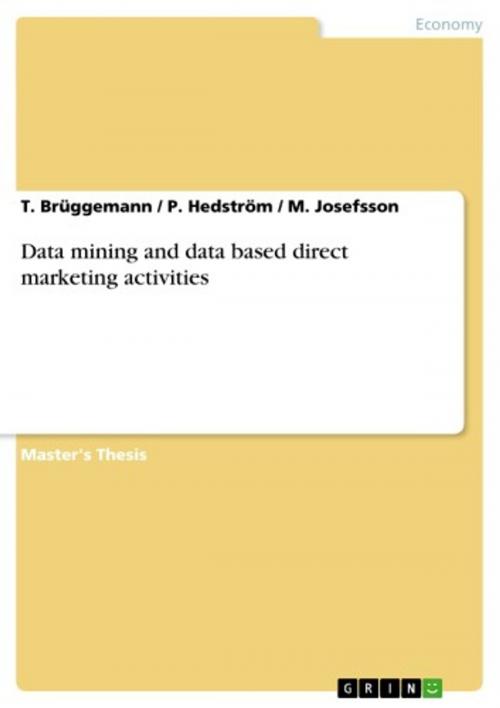| Author: | T. Brüggemann, P. Hedström, M. Josefsson | ISBN: | 9783638245791 |
| Publisher: | GRIN Publishing | Publication: | January 16, 2004 |
| Imprint: | GRIN Publishing | Language: | English |
| Author: | T. Brüggemann, P. Hedström, M. Josefsson |
| ISBN: | 9783638245791 |
| Publisher: | GRIN Publishing |
| Publication: | January 16, 2004 |
| Imprint: | GRIN Publishing |
| Language: | English |
Master's Thesis from the year 2004 in the subject Business economics - Marketing, Corporate Communication, CRM, Market Research, Social Media, grade: 1,7 (A-), Växjö University (School of Management and Economics), course: International Business Environment, 40 entries in the bibliography, language: English, abstract: Widespread changes within business environments in recent years has demanded acquisitions of new tools that are more skilled to cope with new challenges and demands in business. Advances in computer technologies, higher accessibility of computer associated tools and decreased prices of general computer-related products are reasons enough for at least considerations about higher usage of new technologies. Particularly in direct marketing activities discussed technology is called Data Mining. Companies are faced with hosts of data collected in their data repositories. Of course, companies want to make use of their data and aim to discover interesting patterns of knowledge within their data repositories. Direct marketers which can be involved in catalogue marketing, telemarketing or widely known direct-mail marketing are intensive users of Data Mining Technologies. Because of that, the authors strive to do research concerning reasons for and advantages and disadvantages with using Data Mining as support for direct marketing activities. Chapter 1 deals with general information for the reader as support for delving into the topic. The included problem discussion finishes with the final problem formulation of this thesis. Chapter 2 is about the Methodology which includes considerations of Gummesson. The following theoretical part is divided into two major parts, Data Mining and Direct Marketing, which underpin the whole thesis. The authors want to inform the reader about important and sophisticated contents concerning both Data Mining and Direct Marketing. Without overloading the implementations about Data Mining and Direct Marketing, the authors conduct the reader to essential and detailed aspects of both fields for understanding the intentions. The empirical part contains a short introduction to each company within the thesis, and short summaries of the interviews conducted. In the following analysis part the authors have created a model to make the possible uses of Data Mining more understandable to the reader. Furthermore, this part contains an analysis of the interviews in relation to the topic at hand and the theories used. In the conclusions the authors answer their research question, namely; what are the main advantages and disadvantages of Data Mining as support to Direct Marketing activities? In the absolute end of the thesis the authors criticise their own work and give suggestions for further research within the topic.
Master's Thesis from the year 2004 in the subject Business economics - Marketing, Corporate Communication, CRM, Market Research, Social Media, grade: 1,7 (A-), Växjö University (School of Management and Economics), course: International Business Environment, 40 entries in the bibliography, language: English, abstract: Widespread changes within business environments in recent years has demanded acquisitions of new tools that are more skilled to cope with new challenges and demands in business. Advances in computer technologies, higher accessibility of computer associated tools and decreased prices of general computer-related products are reasons enough for at least considerations about higher usage of new technologies. Particularly in direct marketing activities discussed technology is called Data Mining. Companies are faced with hosts of data collected in their data repositories. Of course, companies want to make use of their data and aim to discover interesting patterns of knowledge within their data repositories. Direct marketers which can be involved in catalogue marketing, telemarketing or widely known direct-mail marketing are intensive users of Data Mining Technologies. Because of that, the authors strive to do research concerning reasons for and advantages and disadvantages with using Data Mining as support for direct marketing activities. Chapter 1 deals with general information for the reader as support for delving into the topic. The included problem discussion finishes with the final problem formulation of this thesis. Chapter 2 is about the Methodology which includes considerations of Gummesson. The following theoretical part is divided into two major parts, Data Mining and Direct Marketing, which underpin the whole thesis. The authors want to inform the reader about important and sophisticated contents concerning both Data Mining and Direct Marketing. Without overloading the implementations about Data Mining and Direct Marketing, the authors conduct the reader to essential and detailed aspects of both fields for understanding the intentions. The empirical part contains a short introduction to each company within the thesis, and short summaries of the interviews conducted. In the following analysis part the authors have created a model to make the possible uses of Data Mining more understandable to the reader. Furthermore, this part contains an analysis of the interviews in relation to the topic at hand and the theories used. In the conclusions the authors answer their research question, namely; what are the main advantages and disadvantages of Data Mining as support to Direct Marketing activities? In the absolute end of the thesis the authors criticise their own work and give suggestions for further research within the topic.















